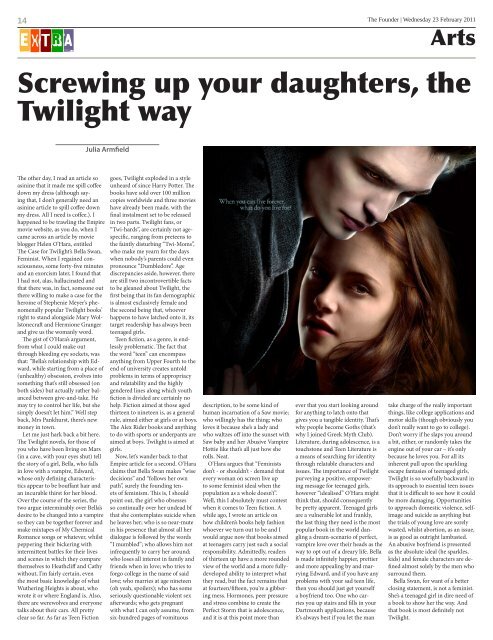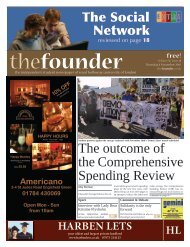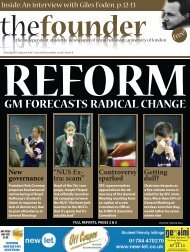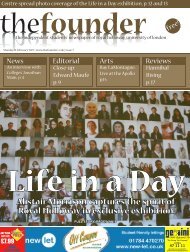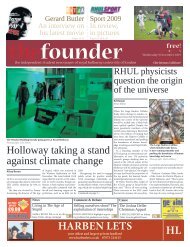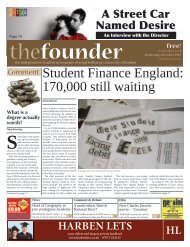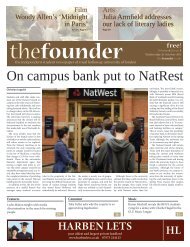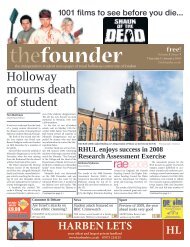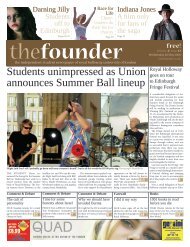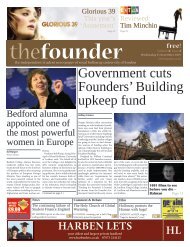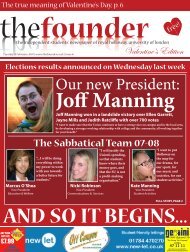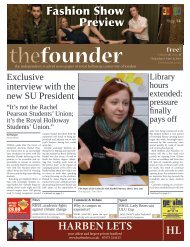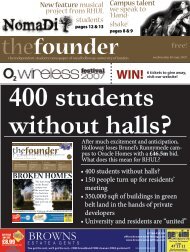Create successful ePaper yourself
Turn your PDF publications into a flip-book with our unique Google optimized e-Paper software.
14 <strong>The</strong> <strong>Founder</strong> | Wednesday 23 February 2011<br />
E X T R A<br />
Arts<br />
Screwing up your daughters, the<br />
Twilight way<br />
Julia Armfield<br />
<strong>The</strong> other day, I read an article so<br />
asinine that it made me spill coffee<br />
down my dress (although saying<br />
that, I don’t generally need an<br />
asinine article to spill coffee down<br />
my dress. All I need is coffee.). I<br />
happened to be trawling the Empire<br />
movie website, as you do, when I<br />
came across an article by movie<br />
blogger Helen O’Hara, entitled<br />
<strong>The</strong> Case for Twilight’s Bella Swan,<br />
Feminist. When I regained consciousness,<br />
some forty-five minutes<br />
and an exorcism later, I found that<br />
I had not, alas, hallucinated and<br />
that there was, in fact, someone out<br />
there willing to make a case for the<br />
heroine of Stephenie Meyer’s phenomenally<br />
popular Twilight books’<br />
right to stand alongside Mary Wollstonecraft<br />
and Hermione Granger<br />
and give us the womanly word.<br />
<strong>The</strong> gist of O’Hara’s argument,<br />
from what I could make out<br />
through bleeding eye sockets, was<br />
that: “Bella’s relationship with Edward,<br />
while starting from a place of<br />
(unhealthy) obsession, evolves into<br />
something that’s still obsessed (on<br />
both sides) but actually rather balanced<br />
between give-and-take. He<br />
may try to control her life, but she<br />
simply doesn’t let him.” Well step<br />
back, Mrs Pankhurst, there’s new<br />
money in town.<br />
Let me just hark back a bit here.<br />
<strong>The</strong> Twilight novels, for those of<br />
you who have been living on Mars<br />
(in a cave, with your eyes shut) tell<br />
the story of a girl, Bella, who falls<br />
in love with a vampire, Edward,<br />
whose only defining characteristics<br />
appear to be bouffant hair and<br />
an incurable thirst for her blood.<br />
Over the course of the series, the<br />
two argue interminably over Bella’s<br />
desire to be changed into a vampire<br />
so they can be together forever and<br />
make mixtapes of My Chemical<br />
Romance songs or whatever, whilst<br />
peppering their bickering with<br />
intermittent battles for their lives<br />
and scenes in which they compare<br />
themselves to Heathcliff and Cathy<br />
without, I’m fairly certain, even<br />
the most basic knowledge of what<br />
Wuthering Heights is about, who<br />
wrote it or where England is. Also,<br />
there are werewolves and everyone<br />
talks about their cars. All pretty<br />
clear so far. As far as Teen Fiction<br />
goes, Twilight exploded in a style<br />
unheard of since Harry Potter. <strong>The</strong><br />
books have sold over 100 million<br />
copies worldwide and three movies<br />
have already been made, with the<br />
final instalment set to be released<br />
in two parts. Twilight fans, or<br />
“Twi-hards”, are certainly not agespecific,<br />
ranging from preteens to<br />
the faintly disturbing “Twi-Moms”,<br />
who make me yearn for the days<br />
when nobody’s parents could even<br />
pronounce “Dumbledore”. Age<br />
discrepancies aside, however, there<br />
are still two incontrovertible facts<br />
to be gleaned about Twilight, the<br />
first being that its fan demographic<br />
is almost exclusively female and<br />
the second being that, whoever<br />
happens to have latched onto it, its<br />
target readership has always been<br />
teenaged girls.<br />
Teen fiction, as a genre, is endlessly<br />
problematic. <strong>The</strong> fact that<br />
the word “teen” can encompass<br />
anything from Upper Fourth to the<br />
end of university creates untold<br />
problems in terms of appropriacy<br />
and relatability and the highly<br />
gendered lines along which youth<br />
fiction is divided are certainly no<br />
help. Fiction aimed at those aged<br />
thirteen to nineteen is, as a general<br />
rule, aimed either at girls or at boys.<br />
<strong>The</strong> Alex Rider books and anything<br />
to do with sports or underpants are<br />
aimed at boys. Twilight is aimed at<br />
girls.<br />
Now, let’s wander back to that<br />
Empire article for a second. O’Hara<br />
claims that Bella Swan makes “wise<br />
decisions” and “follows her own<br />
path”, surely the founding tenets<br />
of feminism. This is, I should<br />
point out, the girl who obsesses<br />
so continually over her undead bf<br />
that she contemplates suicide when<br />
he leaves her; who is so near-mute<br />
in his presence that almost all her<br />
dialogue is followed by the words<br />
“I mumbled”; who allows him not<br />
infrequently to carry her around;<br />
who loses all interest in family and<br />
friends when in love; who tries to<br />
forgo college in the name of said<br />
love; who marries at age nineteen<br />
(oh yeah, spoilers); who has some<br />
seriously questionable violent sex<br />
afterwards; who gets pregnant<br />
with what I can only assume, from<br />
six-hundred pages of vomituous<br />
description, to be some kind of<br />
human incarnation of a Saw movie;<br />
who willingly has the thing; who<br />
loves it because she’s a lady and<br />
who waltzes off into the sunset with<br />
Saw baby and her Abusive Vampire<br />
Hottie like that’s all just how she<br />
rolls. Neat.<br />
O’Hara argues that “Feminists<br />
don’t - or shouldn’t - demand that<br />
every woman on screen live up<br />
to some feminist ideal when the<br />
population as a whole doesn’t”.<br />
Well, this I absolutely must contest<br />
when it comes to Teen fiction. A<br />
while ago, I wrote an article on<br />
how children’s books help fashion<br />
whoever we turn out to be and I<br />
would argue now that books aimed<br />
at teenagers carry just such a social<br />
responsibility. Admittedly, readers<br />
of thirteen up have a more rounded<br />
view of the world and a more fullydeveloped<br />
ability to interpret what<br />
they read, but the fact remains that<br />
at fourteen/fifteen, you’re a gibbering<br />
mess. Hormones, peer pressure<br />
and stress combine to create the<br />
Perfect Storm that is adolescence,<br />
and it is at this point more than<br />
ever that you start looking around<br />
for anything to latch onto that<br />
gives you a tangible identity. That’s<br />
why people become Goths (that’s<br />
why I joined Greek Myth Club).<br />
Literature, during adolescence, is a<br />
touchstone and Teen Literature is<br />
a means of searching for identity<br />
through relatable characters and<br />
issues. <strong>The</strong> importance of Twilight<br />
purveying a positive, empowering<br />
message for teenaged girls,<br />
however “idealised” O’Hara might<br />
think that, should consequently<br />
be pretty apparent. Teenaged girls<br />
are a vulnerable lot and frankly,<br />
the last thing they need is the most<br />
popular book in the world dangling<br />
a dream-scenario of perfect,<br />
vampire love over their heads as the<br />
way to opt out of a dreary life. Bella<br />
is made infinitely happier, prettier<br />
and more appealing by and marrying<br />
Edward, and if you have any<br />
problems with your sad teen life,<br />
then you should just get yourself<br />
a boyfriend too. One who carries<br />
you up stairs and fills in your<br />
Dartmouth applications, because<br />
it’s always best if you let the man<br />
take charge of the really important<br />
things, like college applications and<br />
motor skills (though obviously you<br />
don’t really want to go to college).<br />
Don’t worry if he slaps you around<br />
a bit, either, or randomly takes the<br />
engine out of your car – it’s only<br />
because he loves you. For all its<br />
inherent pull upon the sparkling<br />
escape fantasies of teenaged girls,<br />
Twilight is so woefully backward in<br />
its approach to essential teen issues<br />
that it is difficult to see how it could<br />
be more damaging. Opportunities<br />
to approach domestic violence, selfimage<br />
and suicide as anything but<br />
the trials of young love are sorely<br />
wasted, whilst abortion, as an issue,<br />
is as good as outright lambasted.<br />
An abusive boyfriend is presented<br />
as the absolute ideal (he sparkles,<br />
kids) and female characters are defined<br />
almost solely by the men who<br />
surround them.<br />
Bella Swan, for want of a better<br />
closing statement, is not a feminist.<br />
She’s a teenaged girl in dire need of<br />
a book to show her the way. And<br />
that book is most definitely not<br />
Twilight.


